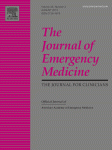Hey all,
Not an EM doc, but I've got a question that I am not able to find a clear answer on. If anyone can provide a guideline/literature that would be great, but even general answers would be appreciated.
So, forgive my very generalized scenario: A 65yo patient is brought into your ED for fevers. On initial assessment, you find him to be diaphoretic, clammy, awake but somewhat confused. Vitals signs are showing mild hypotension, tachycardia, and SPO2 in the high 80's which improves with nasal cannula. You suspect septic shock and begin empiric antibiotics and fluid resuscitation of 30ml/kg after getting initial blood/urine cultures and labs.
Your labs return, and among other derangements, the patient has a sodium level of 160.
My question is two parts-
1) How do you reconcile giving rapid fluid boluses in a patient like this where you might be concerned about rapidly over-correcting her sodium?
2) In the absence of being able to obtain proper history, how do you decide whether this patients confusion is d/t delirium from sepsis, or d/t rapid sodium level changes? (I acknowledge given the bigger picture here, the AMS is likely d/t sepsis, but hear me out )
)
Thanks guys!
Not an EM doc, but I've got a question that I am not able to find a clear answer on. If anyone can provide a guideline/literature that would be great, but even general answers would be appreciated.
So, forgive my very generalized scenario: A 65yo patient is brought into your ED for fevers. On initial assessment, you find him to be diaphoretic, clammy, awake but somewhat confused. Vitals signs are showing mild hypotension, tachycardia, and SPO2 in the high 80's which improves with nasal cannula. You suspect septic shock and begin empiric antibiotics and fluid resuscitation of 30ml/kg after getting initial blood/urine cultures and labs.
Your labs return, and among other derangements, the patient has a sodium level of 160.
My question is two parts-
1) How do you reconcile giving rapid fluid boluses in a patient like this where you might be concerned about rapidly over-correcting her sodium?
2) In the absence of being able to obtain proper history, how do you decide whether this patients confusion is d/t delirium from sepsis, or d/t rapid sodium level changes? (I acknowledge given the bigger picture here, the AMS is likely d/t sepsis, but hear me out
Thanks guys!


